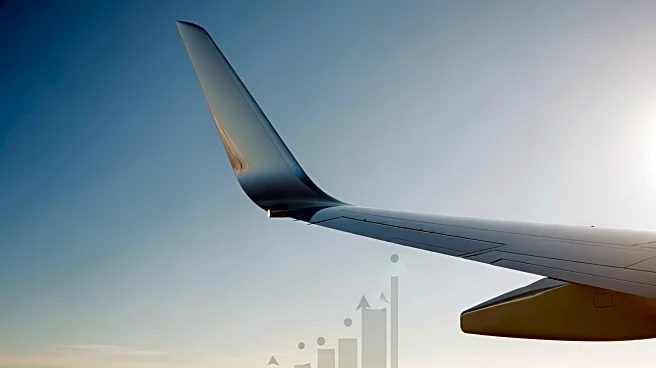What's Happening?
Portuguese airline TAP has announced a 14.4% increase in its third-quarter net profit compared to the previous year. This growth is attributed to higher revenues, lower interest costs, and currency gains. The airline reported a net profit of 126 million
euros ($145.85 million) for the period between July and September. Despite facing handling disruptions and border-control bottlenecks in Portugal and across Europe, TAP experienced a 2.7% rise in quarterly revenue, reaching 1.3 billion euros. Passenger numbers increased by 4.2% to approximately 4.8 million during one of the busiest summers in recent years. However, operating costs also rose by 4.8% to 1.1 billion euros, driven by a 5% increase in employee expenses and an 11% rise in traffic costs. TAP's EBITDA fell by 4.4% to 332.8 million euros, with its EBITDA margin decreasing to 25.1% from 27% a year ago.
Why It's Important?
The financial performance of TAP is significant as it reflects the airline's resilience in a competitive market, especially as it undergoes partial privatization. The Portuguese government relaunched the privatization process in July, aiming to sell a 44.9% stake, with an additional 5% reserved for staff. Major European airlines such as Lufthansa, Air France-KLM, and British Airways owner IAG have expressed interest in acquiring a stake. The robust bookings indicate strong demand for air travel, which is crucial for TAP's future profitability and strategic positioning in the aviation industry. The airline's ability to maintain high booking levels despite operational challenges suggests a positive outlook for its continued growth and competitiveness.
What's Next?
As TAP continues its privatization process, the interest from major airlines could lead to strategic partnerships or acquisitions that may enhance its market position and operational capabilities. The airline's focus on maintaining robust bookings will be crucial in navigating competitive pressures in key markets. Stakeholders will be closely monitoring the privatization developments and potential impacts on TAP's business strategy and market dynamics. The outcome of the privatization could significantly influence TAP's future operations and its role in the European aviation sector.
















